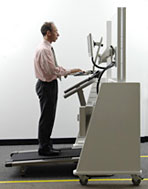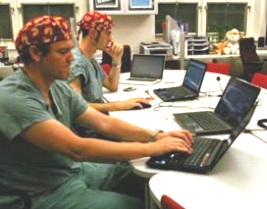September 20th, 2010 by JenniferKearneyStrouse in Better Health Network, Health Policy, Health Tips, News, Quackery Exposed
Tags: ACP Internist, Adrenal Fatigue, Dangerous Side Effects, Endocrine Society, Fake Diseases, Faux Medical Conditions on the Internet, General Medicine, Hormone Foundation, LA Times, Public Safety, Wilson's Temperature Syndrome
No Comments »

Ever heard of adrenal fatigue? Wilson’s temperature syndrome? If not, there’s a good reason: They exist only on the Internet.
The Hormone Foundation, an affiliate of the Endocrine Society, recently issued two fact sheets for patients debunking these so-called conditions, which were “apparently conceived only in an effort to sell products promoted to treat them,” the LA Times reported. No medical evidence supports either faux disease and there are no tests or treatments for them, but patients still try to alleviate them with supplements, some of them potentially dangerous, the Times said.
Adrenal fatigue is characterized by such “symptoms” as having salt and sugar cravings and needing coffee to get you through the day, while the man who discovered Wilson’s temperature syndrome also coincidentally promotes a product to treat it, according to the Times. (Hormone Foundation, LA Times)

*This blog post was originally published at ACP Internist*
September 19th, 2010 by Maria Gifford in Better Health Network, Expert Interviews, Health Tips, Research
Tags: #txfm2010, Body Weight, Diet and Exercise, Diet and Nutrition, Dr. Jim Levine, Food and Nutrition, Human Energy Requirements, Human Nutrition, Maintain weight, Maria Gifford, Mayo Clinic Transform 2010, Metabolism, Muve, NEAT, Non-Exercise Activity Thermogenesis, Nutrition and Health, Obesity, Physical Activity, Physiology, Treadmill Desk, Trek Desk, Undernutrition, Walk At Work, Walkstation, Weight Control, Weight Management
No Comments »
 Obesity doesn’t stand a chance against Dr. Jim Levine, one of the prestigious presenters at Mayo Clinic’s Transform 2010 conference last week. Dr. Levine’s fascinating research focuses on helping people understand obesity, weight reduction, and Non-Exercise Activity Thermogenesis (NEAT) — the idea that expending calories through the activities of daily living is more important for calorie burning than exercise is.
Obesity doesn’t stand a chance against Dr. Jim Levine, one of the prestigious presenters at Mayo Clinic’s Transform 2010 conference last week. Dr. Levine’s fascinating research focuses on helping people understand obesity, weight reduction, and Non-Exercise Activity Thermogenesis (NEAT) — the idea that expending calories through the activities of daily living is more important for calorie burning than exercise is.
Dr. Levine’s “Treadmill Desk” has won more than 50 national and international awards in science, including the Judson Daland prize from the American Philosophical Society, the Invention of the Future Award from NASA, and the Innovation Award at the World Fair. The “Walkstation” is now a product of Steelcase.
Dr. Levine’s work has been highlighted nationally around the world, and he has produced documentary films with the BBC, ABC, and CNN. His Walkstation has been featured in The New York Times, his vision of a future where office people walk at work in USA Today, and his Treadmill Desk tested live on Good Morning America. Read more »
September 19th, 2010 by Davis Liu, M.D. in Better Health Network, Health Policy, Opinion
Tags: Consumer-Driven Healthcare, Dr. Davis Liu, Empowered Patients, Fixing American Healthcare, Health of Americans, Patient Empowerment, Transparency In Medicine, U.S. Healthcare System
No Comments »

 Empowered patient. Consumer driven healthcare. Transparency. Access to their full medical records online. Review the latest news and you’ll discover more books and articles recommending patients be advocates for themselves. The pitch? The only way to get the best care is to be thorough, informed, and always asking questions.
Empowered patient. Consumer driven healthcare. Transparency. Access to their full medical records online. Review the latest news and you’ll discover more books and articles recommending patients be advocates for themselves. The pitch? The only way to get the best care is to be thorough, informed, and always asking questions.
This perspective is understandable because advocates have observed a healthcare system that provides inconsistent quality, too many preventable medical errors, and overtreatment resulting in unnecessary injuries and deaths. Even I’ve written a book saying the same thing, and I hate to write.
The public is urged to take charge of their health and their healthcare. When they have a problem, ask the doctor questions. Do research. If they need a procedure, shop around to get the best deal. Adopt good habits. Eat more fruits and vegetables. Stop smoking. Maintain a healthy weight. Exercise regularly. These will improve health and be less costly in the long run.
But is this what Americans really want? Do they want to be empowered patients? Can they be empowered patients? Frankly, no. Read more »
*This blog post was originally published at Saving Money and Surviving the Healthcare Crisis*
September 19th, 2010 by KevinMD in Announcements, Better Health Network, Health Policy, Medblogger Shout Outs, News, Opinion
Tags: Doctors and Social Media, Mayo Clinic Center for Health Care Social Media, Social Media In Medicine
No Comments »

The Mayo Clinic has always been at the forefront of the social media and health care intersection, and is the first institution to have an official Center for Social Media.
When they recently announced the invited first 13 members of their Advisory Board for the Mayo Clinic Center for Health Care Social Media, the first thing I noticed that there were zero physicians, and few with clinical experience. What a slap in the face.
There’s little question that the qualifications of the selected members are beyond reproach, and all are respected luminaries in the health care social media field. But this is the Mayo Clinic, one of the leading health care institutions in the country, so it’s odd that clinician-bloggers were blatantly ignored. Read more »
*This blog post was originally published at KevinMD.com*
September 18th, 2010 by Medgadget in Better Health Network, News, Research
Tags: Anesthesiology, General Surgery, Italy, McGill-McGill University Health Centre, Montreal, Pisa, Preoperative Assessment At Home Via Teleconference, Remoted-Performed Surgery, Surgery Via Teleconference, Surgery Videoconferencing, Teleanesthesia, Thyroid Gland Surgery, Transcontinental Anesthesia
No Comments »

 Just two weeks after we reported on teleanesthesia in the form of remotely-performed nerve blocks, the first report of transcontinental anesthesia comes in.
Just two weeks after we reported on teleanesthesia in the form of remotely-performed nerve blocks, the first report of transcontinental anesthesia comes in.
On August 30, anesthesiologists of McGill-McGill University Health Centre in Montreal, kept watch over a patient in Pisa, Italy, undergoing thyroid gland surgery. Basically they used a teleconferencing setup with four cameras, with two cameras streaming the anesthesia data (ventilation parameters and vital signs), one camera aimed at the operating field, and the last one for any special purposes. Read more »
*This blog post was originally published at Medgadget*



 Obesity doesn’t stand a chance against Dr. Jim Levine, one of the prestigious presenters at Mayo Clinic’s
Obesity doesn’t stand a chance against Dr. Jim Levine, one of the prestigious presenters at Mayo Clinic’s 
 Empowered patient. Consumer driven healthcare. Transparency. Access to their full medical records online. Review the latest news and you’ll discover more books and articles recommending patients be advocates for themselves. The pitch? The only way to get the best care is to be thorough, informed, and always asking questions.
Empowered patient. Consumer driven healthcare. Transparency. Access to their full medical records online. Review the latest news and you’ll discover more books and articles recommending patients be advocates for themselves. The pitch? The only way to get the best care is to be thorough, informed, and always asking questions.

 Just two weeks after we reported on teleanesthesia in the form of
Just two weeks after we reported on teleanesthesia in the form of 







